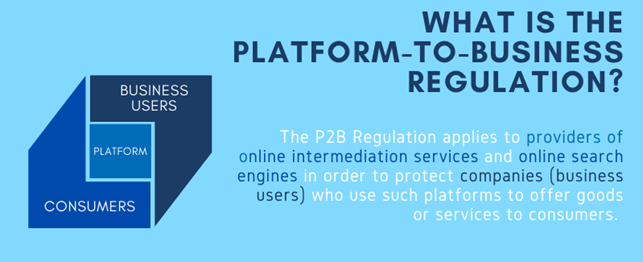Online platforms are online spaces where users (businesses and consumers) are brought together by a platform operator in order to facilitate an interaction (e.g. exchanging information, commercial transactions). Types of online platforms include:
- Online marketplaces (e.g. Amazon, eBay, Allegro, etc.)
- Tourism and hospitality platforms (e.g. Booking.com, Hotels.com, TripAdvisor, etc.)
- Online application stores (e.g. Apple App Store, Google Play Store, Samsung Galaxy Apps, etc.)
- Online search engines (e.g. Google, Bing, Yahoo, etc.)
- Social media platforms (e.g. Twitter, Facebook, Instagram, etc.)
- Online media platforms (e.g. YouTube, Vimeo, Dailymotion, etc.)
PPMI is assessing whether businesses are treated fairly by online platforms and is aiming to understand what recurring issues persist to this day. This work is carried out as part of the study for the European Commission on ‘Evaluation of the Regulation (EU) 2019/1150 on promoting fairness and transparency for business users of online intermediation services (the P2B Regulation)’.
If you represent a business selling goods and services on online platforms or you work for an online platform, you are invited to share your experiences with PPMI! Your views will help us to assess the current state of the platform-to-business relationships in Europe.
The study is positioned in the broader context of the platform economy. The European Commission adopted the P2B Regulation to correct existing power imbalances between online platforms and businesses who use them. The Regulation lays down the first ever set of rules obliging platforms to become more transparent with regard to their business users. It aims to create a fair, transparent and predictable business environment for sellers on online platforms. The P2B Regulation has entered into force in the EU on 12 July 2020.
According to the Regulation, online platforms are obliged to:
- introduce certain changes to their terms & conditions (T&Cs), making them clear and easily available as well as informing businesses about those changes
- providing businesses with reasons for restriction, suspension or termination of their accounts with at least a 15-day notice
- providing information about platforms’ ranking parameters, and
- explaining to which data the platforms and businesses have access to

As part of the study, we are exploring what effect the Regulation has had on online sellers and online platforms. We are exploring whether businesses using online platforms are treated fairly by the platforms, whether they are able to resolve issues in an efficient and affordable manner and whether they feel like they have enough information about their rights of the platform.
Our findings will feed into the European Commission’s implementation report. In addition, based on the study findings, we will also propose a methodology for the final evaluation of the Regulation taking place in 2025.
As part of the study, we are conducting interviews and focus groups with key stakeholders affected by the Regulation, including business users, online platforms and national authorities. Interested to join in? Drop us a message!
If you want to learn more about the study or if you are willing to share your views on the platform economy and platform transparency, do get in touch with Barbora Kudzmanaitė from the PPMI team.








